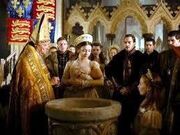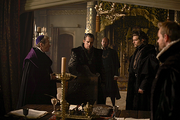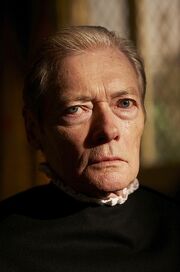Bishop Stephen Gardiner is the Bishop of Winchester in The Tudors, and appears in Seasons 3 and 4 played by late English actor Simon Ward (he also appears briefly in Season One played by a different actor). While careful to publicly acknowledge King Henry VIII as Head of the Church of England, in private Gardiner is presented as a fanatical Catholic who forms the backbone of the counter-Reformation, seeking to overturn Thomas Cromwell and locate and destroy those he considers 'heretics.' Once he becomes part of Henry's privy Council, he increasingly pushes this agenda along with his ally Thomas Wriothesley, as both of them are concerned that England's society and foreign policy are dependant on the country returning to Catholicism. Henry eventually becomes tired and annoyed by Gardiner's ruthless efforts- which further fuel the schism of his kingdom and banishes him from court and later imprisons him. He remained in the Tower during King Edward VI's reign and was released when Mary Tudor became Queen and he was her Chancellor until his death in 1555.
Season One[]
Gardiner briefly appears in Season One played by Alan Devine; he is a lawyer and the secretary of Cardinal Wolsey, the King's First Minister. Alongside his future rival Cromwell, Gardiner acts as one of Wolsey's confidants when discussing the Pope's reluctance to resolve King Henry's "Great Matter" of divorcing Catherine of Aragon and re-marrying to Anne Boleyn. Wolsey intends to send Gardiner and another lawyer, Edward Fox, to put the case directly to the Pope- who is now held under house arrest by the armies of Emperor Charles V, Catherine's nephew and a staunch opponent of the divorce. Gardiner warns Wolsey that the Emperor will still have more leverage, since "the swords of the King of England are much further away than those of the Emperor... diplomacy is nearly always settled by such... proximity." to which Wolsey replies, "Spoke like a true lawyer."
Like Wolsey, although he is a Catholic and despises the Protestant Reformation, Gardiner wishes to please the King. When he and Fox are sent to Italy in episode 1.07 the two shows Pope Clement all due respect, but nonetheless urge him to find in favor of the King when resolving the case, praising Anne Boleyn's supposed 'virtues' as a potential wife and disparraging rumors that Henry has already impregnated her. Gardiner also passes the Pope a warning from Wolsey that the King will seek resolution by other means- potentially Protestant ones- if the Pope's answer fails to satisfy him. When the Pope casually dismisses this threat as a bluff, Gardiner looks worried, as like Wolsey he knows Henry is not bluffing.
Although Gardiner and Fox fail to provide decisive results, Henry later rewards Gardiner's efforts with one of Wolsey's bishoprics after the latter falls from power (though this is not shown in the series).
Season Three[]
Bishop Gardiner is first shown in Season Three presiding over Henry and Jane Seymour's wedding in episode 3.01, and later speaking with Jane before her wedding night, giving her communion (since Jane is privately a Catholic, albeit a less judgemental one). Gardiner hopes Henry will turn back to favoring Catholicism with Jane on the Throne and encourages her to speak to Henry on this, but the 'Pilgrimage of Grace' rebellion in the North causes Henry to angrily lash out against the Papacy. Gardiner, however, is pleased by Thomas Cromwell's fall from Henry's favor as a result of the Pilgrimage, as Cromwell is the last great voice of the Reformation after Anne Boleyn's execution. He is dismayed by Jane Seymour's death in 3.04, which puts Henry in such a state of grief that the Kingdom is left ungoverned, since none of the council are willing to take orders from Cromwell in Henry's absence. Gardiner is also saddened by the deaths of the pro-Catholic Poles (who are executed by Henry in retribution for the actions of their exiled relative, Cardinal Reginald Pole) in episode 3.06, and takes their confessions. However, he also helps trump the progress of the Reformation by organizing (at Henry's instruction) the Six Articles of Faith, which adhere the Church of England- despite its' break from Rome- to a doctrine that has few differences from Catholicism, to Cromwell's dismay.

Gardiner baptizes Prince Edward
Later in the Season, Gardiner plots with Edward Seymour, Earl of Hertford, his wife the Countess of Hertford, Sir Francis Bryan and Charles Brandon the Duke of Suffolk, to help destroy Cromwell. Since Henry still considers open Lutheranism heresy, they are able to testify Cromwell's defense of Reformation beyond what the King approved, especially after Gardiner gains Henry's approval to burn Cromwell's old friend John Lambert at the stake for heresy. At a Court of Attainder (which does not allow the accused to attend) Gardiner testifies that Cromwell made radical declarations of his defense of Protestantism in Parliament, as well as sheltering various heretics from persecution. This accusation of treason (which was enabled by the King's anger concerning his failed marriage to Anne of Cleves) is enough to bring about Cromwell's execution, to Gardiner's savage satisfaction. The night before Cromwell’s execution, Gardiner, Edward, Anne and Charles smugly
celebrate their success.
Gardiner (left) Charles Brandon (center) and Edward Seymour (right) ally against their common enemy, Cromwell
Season Four []

Bishop Gardiner with King Henry, Secretary Wriothesley, Charles Brandon Duke of Suffolk and Solicitor-General Riche
With Cromwell out of the way, Gardiner rises in influence in Season Four, now Bishop of Winchester and a member of the Privy Council. Despite maintaining his loyalty to the King, he privately has little support for Henry's heir Prince Edward, secretly hoping the King's Catholic eldest daughter, Princess Mary, can be placed on the throne instead.
In episode 4.05, he questions Katherine Howard on the matter of her deceiving the King on her sexual history, encouraging her to take the King's offer of mercy and be banished, if she will only admit her guilt in committing adultery with Francis Dereham. Katherine foolishly claims she was raped and there was no pre-contract between them, continuing to assert her innocence to preserve her dignity. Despite feeling somewhat sorry for her, Gardiner immediately knows she is lying, leading Gardiner and Edward Seymour to question Dereham more carefully. They soon discover she was also unfaithful to the King, which forces Charles Brandon to take her to the Tower and await her execution.
Gardiner also strongly suspects Katherine's cousin the Earl of Surrey of being a Protestant (despite the Howards being a Catholic family) but Henry, who favors Surrey initially, forbids his interrogation. Nonetheless, Gardiner provides Edward Seymour (another of Surrey's enemies) with information on Surrey, in the hope that he can one day use it; thus his alliance with the Earl of Hertford is kept intact, though Gardiner increasingly becomes suspicious (correctly) that Seymour is a pro-Reformer.
In the latter part of the Season, Gardiner, knowing the King's sixth wife Catherine Parr is secretly a Lutheran, takes charge of the counter-Reformation faction and begins hunting down as many Lutherans as he can. However, to his fury he is temporarily thwarted when the King appoints Catherine Regent while he is at war in France. To the dismay of Gardiner and his allies, Lord Chancellor Wriothesley and Solicitor-General Riche, the indecisive war bankrupts the royal exchequer and leaves Protestant England completely isolated. Gardiner fears the Lutherans are increasing their influence again in response. His former alliance with the Earl of Hertford shatters, as he is now certain Seymour and his wife Anna are Reformers; Wriothesley sees Lady Hertford weeping at the burning of one of her Protestant friends, Anne Askew. Gardiner instead allies directly with Princess Mary Tudor, explaining to her that he hopes to arrest both Edward Seymour(who is the leader of the Reformer faction despite being less than dedicated to it) and Queen Catherine and remove as many obstacles from her path to the Throne. Mary, thinking Catherine and Edward are bringing up her younger siblings as heretics, accepts and supports Gardiner's investigations. Gardiner is pleased when his ally Wriothesley is appointed Lord Chancellor in episode 4.09, thinking it indicates that King Henry favors a return to Catholicism.

Bishop Gardiner near the end of Season Four
In episode 4.09. Gardiner comes perilously close to discovering proof of the Queen's 'heresy' and temporarily arrests some of her ladies, including her sister, on Henry's permission. He is thwarted from discovering proof of the Seymours' guilt, however, when Anna Stanhope (Seymour's wife) vengefully blackmails him: she has discovered that he embezzled two rich monasteries, similar to the corruption of Cardinal Wolsey, which would technically make him guilty of stealing from the King's treasury if she reported it. Anna smugly advises Gardiner to tear up the arrest warrants he was preparing to send for her and her husband.
Furious at this defeat, Gardiner draws up an arrest warrant for the Queen herself, but it is shown to her by the pro-Lutheran messenger and she and her ladies destroy all evidence. Meanwhile, Gardiner and Wriothesley helps lead the prosecution against another of his enemies, Henry Howard the Earl of Surrey. In this case, he is more successful; Surrey is found guilty of treason and taken to be executed.
King Henry, meanwhile, while not willing to allow further public reformations, is growing angry with Gardiner's vindictiveness towards non-Catholics, which helps fuel the religious division of England. Having had enough, he allows Wriothesley (prompted by Gardiner), to present the arrest warrant for Catherine in the series finale, but then yells furiously at Wriothesley and tells him to get out of his sight. Bishop Gardiner, shocked by this reversal, opens a council with his allies Wriothesley and Sir Richard Riche in a transparent attempt to control Henry's succession by 'assessing' the protection of his son Prince Edward; his archenemy the Earl of Hertford, the Prince's uncle, sees through this immediately and accuses them of plotting to sieze power, when he, as a blood relative of the Prince, has Edward's safety firmly in hand. When Gardiner attempts to rebutt, claiming Seymour's control of his nephew is suspicious, Hertford punches him in the jaw and leaves. Gardiner tries to see Henry in response, but to his shock he is informed the King has banished him permanently from Court; as soon as he leaves, Wriothesley switches sides and joins the Seymour brothers' faction, securing Edward's position.
Historical Aftermath/ Background[]
Gardiner did not in fact lose Henry's favor and remained in hand as a valued diplomat and clergyman, though his influence decreased greatly during the King's marriage to Catherine Parr. However, Henry made no provisions for Gardiner in his will. During the reign of Henry's successor and son Edward VI, Gardiner openly protested the radical Protestant reforms put into place by the King and his advisers. As a consequence, he was soon arrested, stripped of all power and put in the Tower for the rest of Edward's reign.
On the accession of the Catholic Mary I, Edward's half-sister and successor, Gardiner was released and restored to power, becoming her Lord Chancellor. Although Gardiner supported her ruthless religious policies, he actually advised her against her marriage to King Philip of Spain, accurately predicting it would damage her popularity in England; nonetheless, he managed to gain advance notice of Wyatt's Rebellion by arresting and interrogating one of the conspirators, giving Mary's forces time to crush it. Gardiner died in 1555 of illness. His attempts to restore Catholicism to England through Mary were ultimately undone by her successor and sister, Queen Elizabeth (whom Gardiner had attempted to have tried and executed for treason during Mary's reign). Historically, it was not he but Thomas Cranmer who interrogated Katherine Howard.
Gardiner had originally come to Henry's notice through his elevation by Cardinal Wolsey; Henry granted Gardiner one of Wolsey's bishoprics after the latter's death, since Gardiner (although a Catholic by doctrine) had argued hard with the Pope in favor of Henry's divorce from Catherine of Aragon.
Quotes[]
- Gardiner:"Mr. Wriothesley... what have you heard of the Queen's religious beliefs?"
- Wriothesley: "They are the same, surely, as His Majesty."
- Gardiner: "I think not. In fact, I suspect her of being a secret Protestant... and I intend, one day, to prove it."
- Wriothelsey: "...And, in doing so, risk the King's wrath?"
- Gardiner: (sharply) "Mr. Wriothesley, for the sake of our faith and the future of our country, I am prepared to risk a great deal, indeed."

